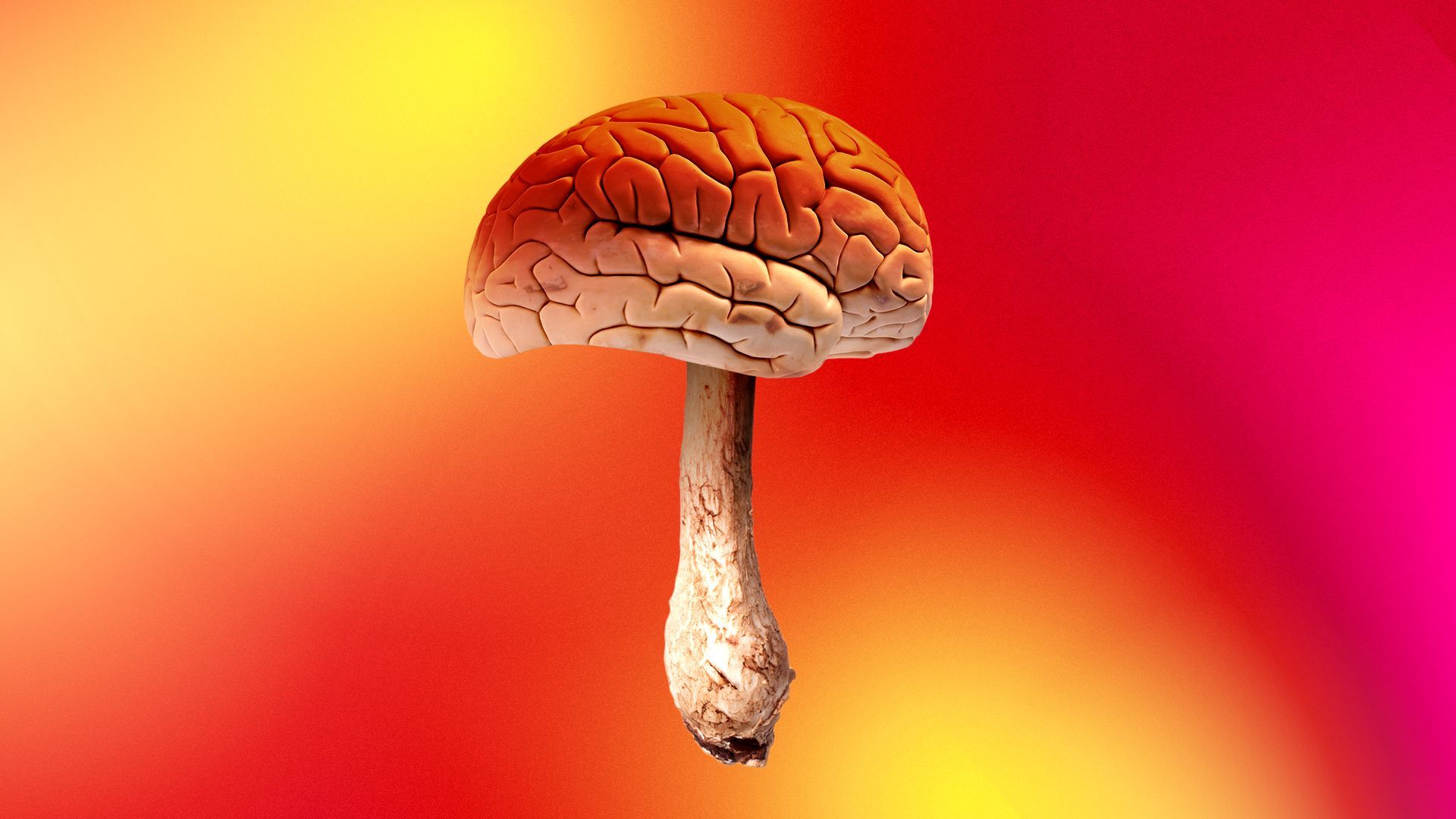
Illustration: Annelise Capossela/Axios
Medical marijuana ignited fiery debates over whether a once-off-limit substance could have positive health effects. But as the Food and Drug Administration advances research into psychedelics like LSD and magic mushrooms, there's little of the same pushback.
Why it matters: It's a sign of how formerly taboo compounds have gained a foothold in the health care market — and how the nation is reevaluating approaches to mental health and the addiction crisis.
- "Mushrooms and psychedelics really never had the negative narrative for 80 years like marijuana did," said Robert Head, chair of Texas-based nonprofit Hemp for Victory, which promotes how cannabis can help veterans.
- "It's a little easier for somebody to accept [psychedelics] because of not having to admit they were wrong," Head told Axios. "This is new information for them."
Driving the news: The FDA last month laid out guidance for psychedelic drug trials for the first time that could lead to the mainstreaming of hallucinogenic substances as behavioral health treatments.
- And instead of controversy, there's bipartisan support in Congress and a burgeoning psychedelics industry with trade shows, celebrity endorsers and eager patient groups like veterans with post-traumatic stress disorder.
The big picture: Marijuana and psychedelics are both Schedule I substances, defined as having high addictive potential and no current accepted medical use.
- But psychedelics have significant effects on the brain, which is why they're tightly regulated and research to date has struggled to meet best scientific practices.
- Psychedelics now have "a leg up" in being perceived as a mental health treatment, while marijuana still is viewed as a recreational drug that's largely used under unsupervised conditions, said Paul Appelbaum, a psychiatrist at Columbia University, who has researched policy around psychedelics.
- In one sign of that acceptance, lawmakers added an amendment to a sweeping defense policy bill that the House passed last week that directs the Pentagon to look into the use of these substances to treat active members' mental health conditions.
- Another amendment could help shift psilocybin, or magic mushrooms, and MDMA to a Schedule II classification, making it easier to research.
Zoom in: Psychedelics groups have avoided some of the pitfalls that befell the medical marijuana movement to build broader acceptance.
- "One of the biggest differences is that the cannabis movement went though state governments to first decriminalize the plant, then medicalize it, and then ... recreational use came after that. Psychedelics are primarily going through the FDA" and medical research, said Jason Ortiz, executive director of the advocacy group Students for Sensible Drug Policy.
- The discussion around making psychedelics accessible is "much more about controlled access to therapy" than unsupervised use, he added.
- The change in thinking also comes as the nation grapples with a mental health crisis — and as people seek alternatives to antidepressants, said Antonio Rozier, a pain management physician in Texas who specializes in medical cannabis.
- There are signs psilocybin can treat substance use disorders and depression. LSD has been studied for alcohol addiction and depression. And MDMA, or ecstasy, is shedding its image as a club drug and has become the object of substance use and severe PTSD research.
Between the lines: The stigma around cannabis also has lessened significantly as use becomes more widespread but medically, psychiatrists still worry about its potential to exacerbate depression and anxiety, Appelbaum told Axios.
- Nearly every state has legalized medical cannabis, but reaching that threshold took decades after California became the first in 1996.
- Experts say the slow acceptance was, in part, due to the way cannabis was intertwined with the war on drugs, which focused on marijuana use in the 1990s and disparately affected Black Americans.
- Governors have pushed to pardon people with prior convictions for simple marijuana possession in an attempt to right those failings, but bipartisan support has lagged.
So far, Oregon and Colorado are the only states to have decriminalized the supervised use of psychedelics, though an April analysis in JAMA Psychiatry estimated that most states will legalize psychedelics by 2037.
- The FDA has at least twice granted "breakthrough therapy" status to psilocybin therapies for severe depression, a designation given to expedite the development and review of drugs when preliminary evidence suggests they can successfully treat serious conditions.
What we're watching: Psychedelic research has long been conducted by private companies, but lawmakers now are pushing for more federal funding.
- "We're looking at essentially trying to figure out what this stuff is good for," Rep. Lou Correa (D-Calif.), co-chair of the Congressional Psychedelics Advancing Therapies Caucus, told Axios.
- One of the bipartisan caucus' goal is to have the Department of Veterans Affairs research how veterans can benefit from psychedelics, which Correa says are "a revolutionary treatment ... for mental health issues and for addiction in our society."
- Veterans leading the efforts to mainstream psychedelics could make wider acceptance more likely, prompting that treatment to eventually reach the general public.
- "The veteran voice is helping to bring this to the limelight, but it's also helping to reduce the stigma around these types of therapies," said Juliana Mercer, director of veteran advocacy and public policy for Healing Breakthrough, a group focused on making MDMA-assisted therapy available to veterans with PTSD.

